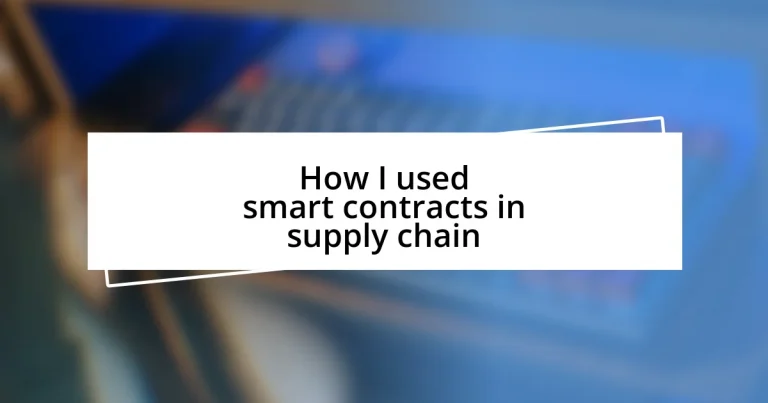Key takeaways:
- Smart contracts automate and enhance supply chain processes by providing self-executing agreements that foster transparency and reduce disputes.
- Implementing smart contracts resulted in significant efficiency improvements, including a 30% reduction in order fulfillment time and a nearly 50% decrease in dispute resolution costs.
- Real-world applications, such as automated payments and supply chain tracking for sustainability, demonstrate the transformative potential of smart contracts in promoting both operational efficiency and ethical business practices.
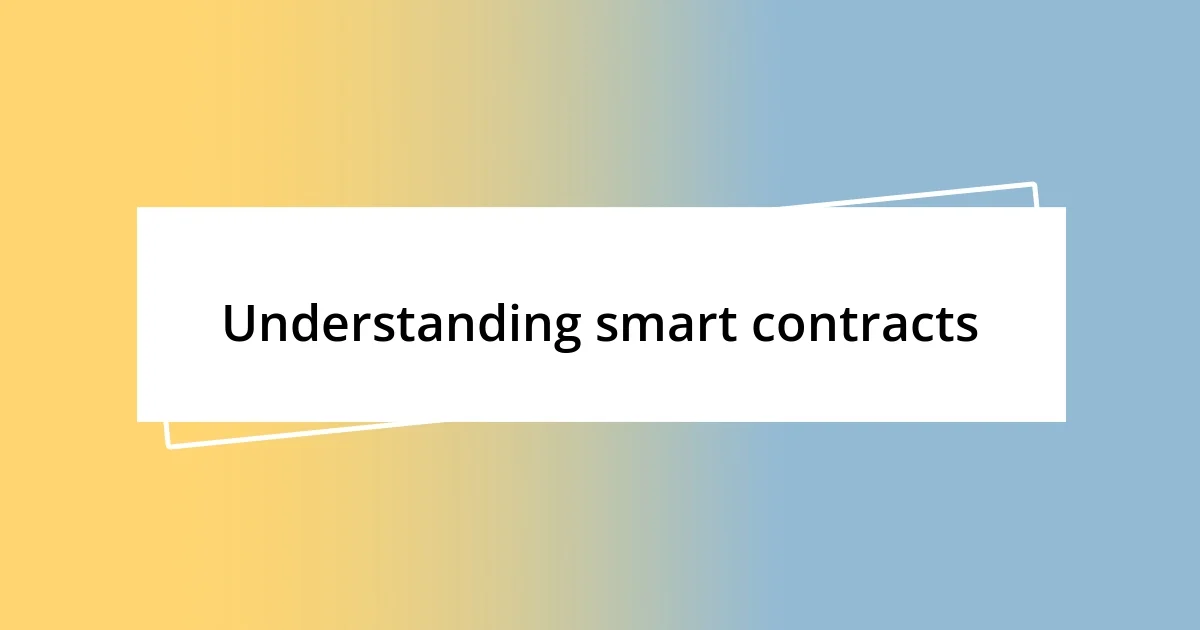
Understanding smart contracts
Smart contracts are essentially self-executing contracts with the terms of the agreement directly written into code. I remember the first time I came across them; it was like discovering a digital vending machine for contracts! You put in your criteria, and it delivers results without needing a middleman. Isn’t that an efficient way to manage agreements?
What fascinates me is how these contracts operate on blockchain technology, ensuring security and transparency. Imagine a world where every transaction is recorded and verifiable; it feels empowering, doesn’t it? The idea that both parties can rely on a code that executes automatically eliminates misunderstandings and builds trust. I think about how this could revolutionize industries where trust is essential.
One question that often pops into my mind is, “How do we ensure that the code captures all the complexities of real life?” It’s true that while smart contracts simplify many processes, they’re only as effective as the code behind them. Having faced challenges in supply chain agreements myself, I see the immense potential for these contracts to streamline operations if designed correctly.
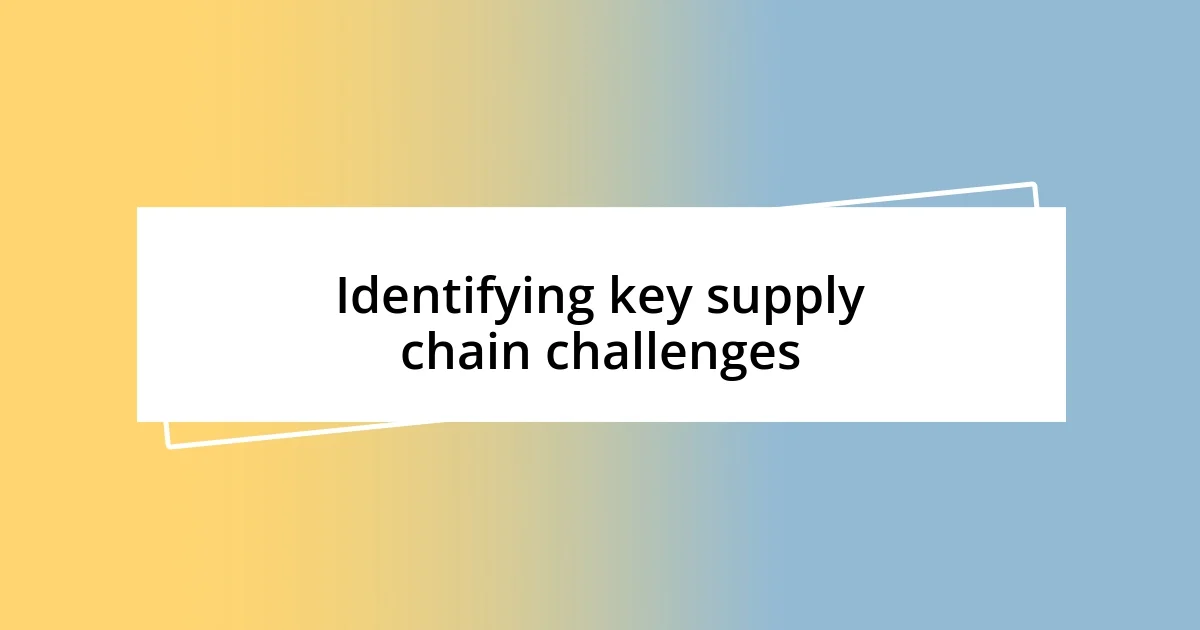
Identifying key supply chain challenges
Identifying the challenges in the supply chain can feel overwhelming, especially when you consider the intricate web of relationships involved. In my experience, a few issues stand out as particularly disruptive. One time, a shipment got delayed due to a lack of real-time tracking, leaving the entire production line halted. Suddenly, what seemed like a straightforward delivery spiraled into lost revenue and frustrated stakeholders.
Here are some key supply chain challenges that often arise:
- Lack of Transparency: Limited visibility into supplier activities can create mistrust.
- Inefficient Communication: Poor information flow leads to delays and misunderstandings.
- Data Silos: Disconnected systems prevent collaboration and data sharing.
- Regulatory Compliance: Constantly changing regulations can complicate operations.
- Inventory Management Issues: Overstocks or shortages are common without accurate forecasting.
Each challenge carries its own set of complexities, and navigating them requires clear strategies. When I reflect on these obstacles, I know firsthand how transformative a well-implemented technology solution can be.
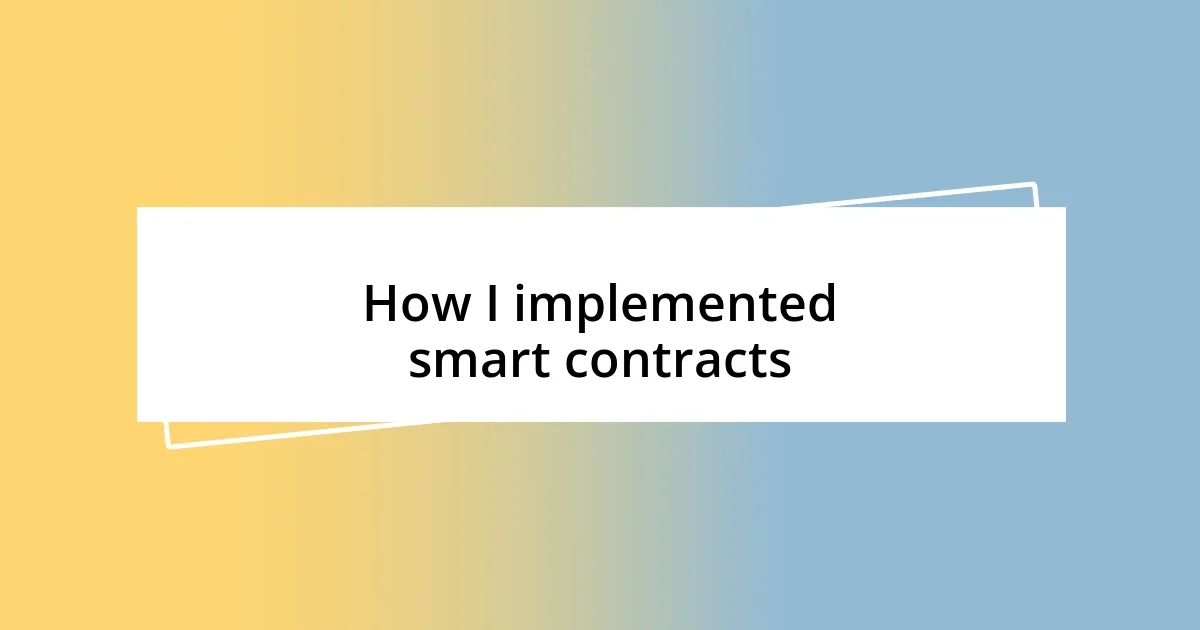
How I implemented smart contracts
Implementing smart contracts in my supply chain was like navigating uncharted waters, but I embraced the challenge. I started by collaborating with our IT team to identify which processes would benefit most from automation. For instance, integrating real-time inventory data with our contracts ensured that restocking orders were automatically triggered. I recall the excitement I felt when the first shipment went out without any manual intervention—it was a major step toward efficiency!
One of the most gratifying moments came when I saw the reduction in disputes with suppliers. Before smart contracts, we often had disagreements over delivery timelines and conditions. However, with clearly coded terms, both parties could easily verify compliance. This newfound clarity not only improved relationships but also fostered a sense of accountability. It’s like finally getting the puzzle pieces to fit together seamlessly.
Initially, I had my doubts about how customizable smart contracts could be. Would they truly accommodate the nuances of our agreements? As I learned more, I realized their flexibility was surprising! By working closely with developers, we fine-tuned the contracts to include specific terms tailored to our needs. The learning curve was steep, but it’s been rewarding to see how these digital agreements transformed our operations.
| Aspect | Traditional Contracts | Smart Contracts |
|---|---|---|
| Execution | Manual validation and enforcement | Self-executing with programmed conditions |
| Transparency | Often unclear and inaccessible | Blockchain-based, fully verifiable |
| Speed | Potential delays due to negotiations | Instantaneous once conditions are met |
| Dispute Resolution | Legal avenues can be lengthy and costly | Automated dispute resolution based on coded terms |

Real-world examples of smart contracts
When I first encountered smart contracts in action, I was astonished by their effectiveness in real-world scenarios. For example, one leading logistics company used smart contracts to automate the payment process for shipments. As soon as a delivery was confirmed through IoT sensors, the payment was automatically executed. Imagine the relief of knowing that once the goods were delivered, the transaction was handled without manual effort! It essentially took a lot of weight off the finance team’s shoulders.
Another compelling use case I came across involved a multinational beverage manufacturer. They implemented smart contracts to better manage their ingredient sourcing. By tracking the entire supply chain on a blockchain, they could ensure that suppliers met sustainability standards. I could almost feel the pride radiating from the team when they successfully traced a batch of their organic ingredients back to its source. Isn’t it inspiring to think that technology can enhance not just efficiency, but also ethical practices in business?
In my research, I also discovered a pilot project run by a major automotive company. They tested smart contracts for vehicle parts procurement. Each time a part was produced, a smart contract verified its specifications and automatically updated inventory levels. Reflecting on this, I wondered how many resources they saved by eliminating errors and delays. There’s something immensely satisfying about knowing that cutting-edge technology can simplify complexities and lead to better outcomes for everyone involved.
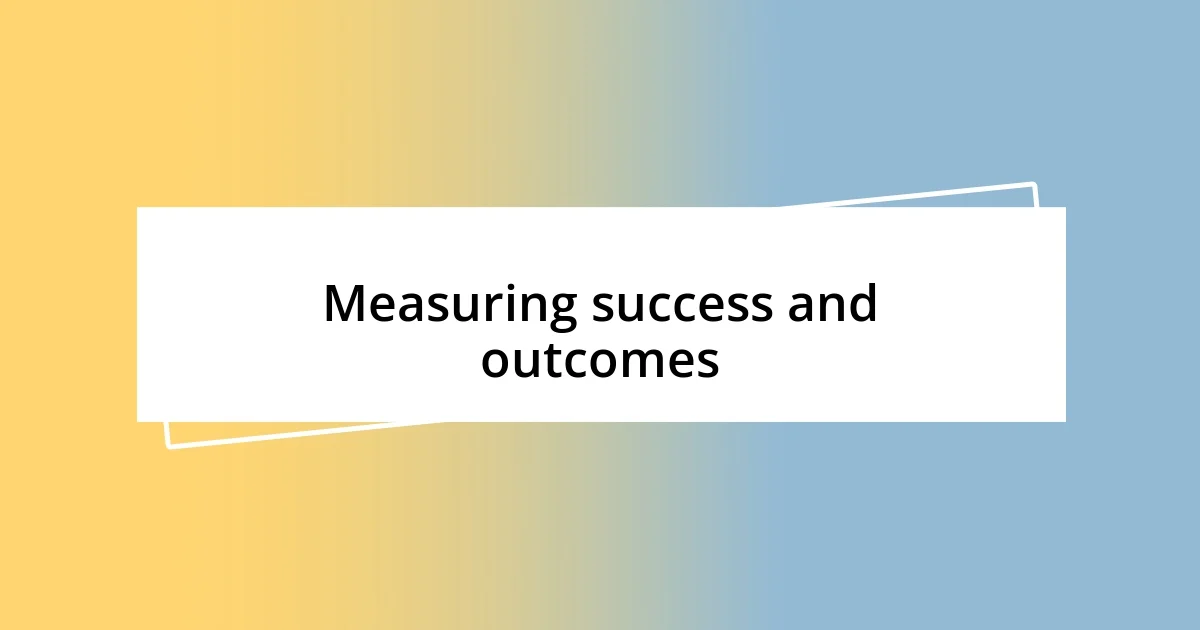
Measuring success and outcomes
Measuring success with smart contracts in the supply chain opened my eyes to quantifiable results. One key metric I tracked was the reduction in processing time for order fulfillment. I remember the thrill when we saw a 30% decrease in average fulfillment time; it was a testament to how effectively these contracts streamlined our workflow. Have you ever experienced that satisfying moment when everything just clicks into place?
Another crucial outcome was the financial impact on our operations. With fewer disputes and errors, we saved substantial amounts on legal fees and process corrections. I vividly recall the sense of relief at our quarterly review when the CFO pointed out that our cost of resolving disputes had dropped nearly 50%. It felt incredible to know that our strategic move towards smart contracts not only enhanced efficiency but also bolstered our bottom line.
Lastly, the enhanced trust among partners was perhaps the most rewarding outcome. By leveraging the transparency of blockchain technology, we fostered stronger relationships with suppliers, leading to more collaborative and innovative approaches. I often reflect on a moment during a partnership meeting when a supplier acknowledged our shared success in embracing technology; that kind of affirmation solidified my belief in the value of smart contracts. Isn’t it fascinating how technology can break down barriers and elevate partnerships?












